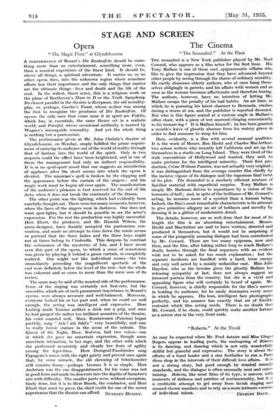STAGE AND SCREEN Opera
" The Magic Flute" at Glyndebourne A PERFORMANCE of Mozart's Die Zauberflote should be some- thing more than an entertainment, something more, even,
than a musical experience of the finest kind. It should be, above all things, a spiritual adventure. It carries us, as no other opera does, into the unknown region where mundane affairs lose their importance and the only things that matter are the ultimate things—love and death and the life of the soul. In the widest, finest sense, this is a religious work on the plane of Beethoven's Mass in D or the Ninth Symphony.
Its closest parallel in the theatre is Everyman, the old morality- play, or, perhaps, Geethe's Faust, whose author was among the first to recognize the greatness of Die Zauberj lOte. Of operas the only ones that come near it in spirit are Fidelio, which has, in essentials, the same theme set in a realistic 'world, and Parsifal, whose occasional sublimity is marred by Wagner's inescapable sensuality. And yet the whole thing is nothing but a pantomime.
The performance given at Mr. John Christie's theatre at Glyndebourne, on Monday, amply fulfilled the prime require- ment of carrying its audience out of the world of reality through that of fantasy into the world of the spirit. Only in two respects could the effect have been heightened, and in one of them the management had only an indirect responsibility.
It is in no spoil-sport mood that one suggests an interdiction of applause after the short scenes into which the opera is divided. The musician's spell is broken by the clapping and the appearance before the curtain of the singers ; and his magic work must be begun all over again. The manifestation of the audience's pleasure is best reserved for the end of the Acts, when it does not break the continuity of the drama.
The other point was the lighting, which had evidently been carefully thought out. There were too many moments, however, when the faces of the singers were in darkness. One does not
want spot-lights, but it should be possible to see the actor's expression. For the rest the production was highly successful.
Herr Ebert, the producer, and Mr. Hamish Wilson, the scene-designer, have frankly accepted the pantomime con- vention, and made no attempt to tone down the comic scenes or pretend that the three ladies and the three boys might not at times belong to Cinderella. This deepens by contrast the seriousness of the mysteries of Isis, and I have never seen this part of the opera, to which a sense of remoteness was given by playing it behind a gauze curtain, so completely realized. One might not like individual scenes—the two immediately preceding the magnificent spectacle at the end we re definitely below the level of the rest—but the whole was coherent and so came to more than the mere sum of its scenes.
The same may be said of the musical side of the performance. Scme of the singing was certainly not first-rate, but the ensembles, which are of such paramount importance in Mozart's cperas, were always accurate and well-balanced. Moreover, everyone looked his or her -part and, when we could see well enough, the acting was intelligent and expressive. Herr Ludwig made Tamino neither a stick nor a prig, and once he had gauged the rather too brilliant acoustics of the theatre, his voice sounded well. Mme. Rautawaara (Pamina) began prettily, sang Ach I ich fiihrs " very beautifully, and rose to really heroic stature in the scene of the ordeals. The Qucen of the Night, Mme. Koecova, had two voices—one in which she gave no uncertain expression, though some uncertain intonation, to her rage, and the other with which she performed accurately and clearly her feats of agility among the leger-lines. Herr Domgraf-Fassbiinder sang Papageno's music with the right gaiety and proved once again that, by some miracle, the old clowning of Sehickaneder still remains funny—perhaps because it is so simple. Herr Andresen was the one disappointment, for his voice was not in good form and made its descents into the depths of Sarastro's airs with difficulty. The smaller parts were, •without exception, finely done, but it is to Herr Busch, the conductor, and Herr Ebert that must be given the chief credit for one of the rarest experiences that the theatre can afford. DYNELEY HUSSEY.


























































 Previous page
Previous page